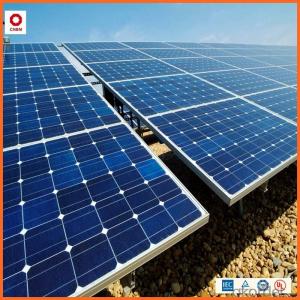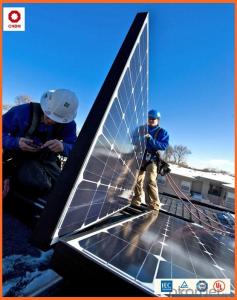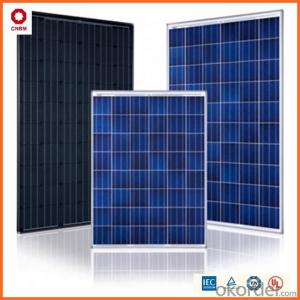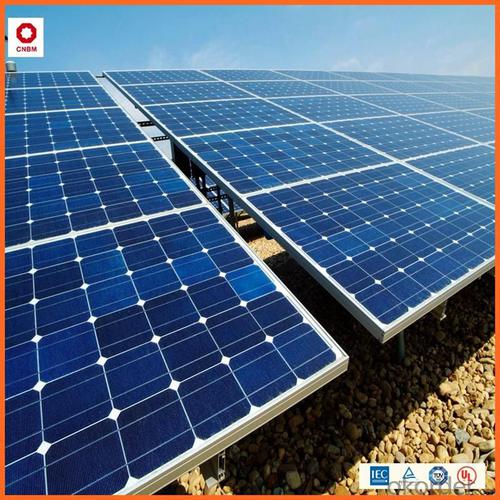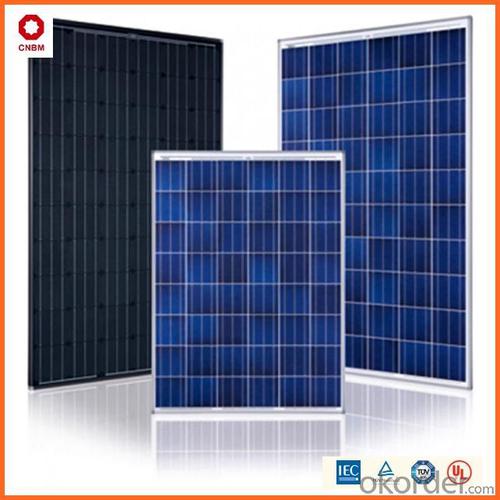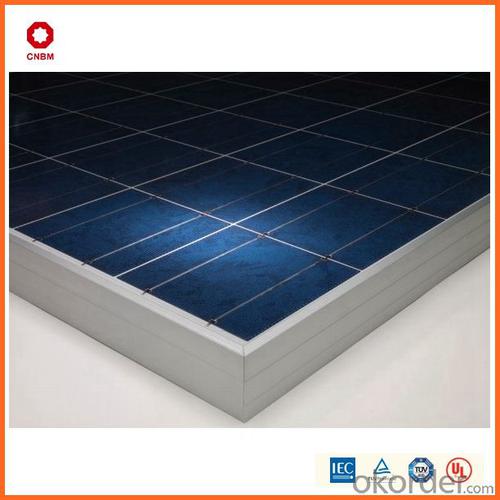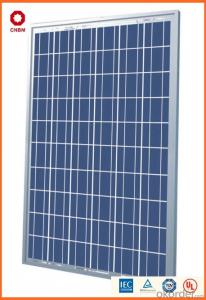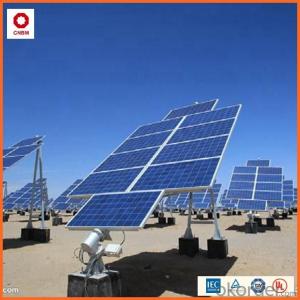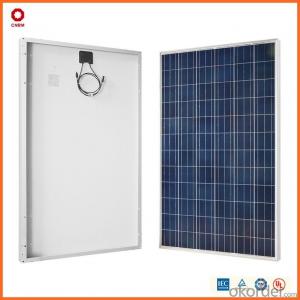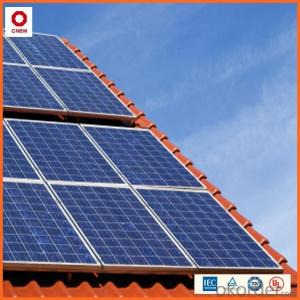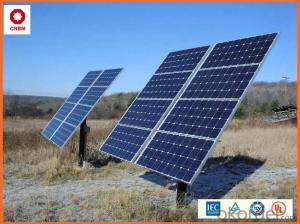A Solar Energy Systems:!!! Hot on Sale!!! Stock 315W Poly Solar Panel USD0.46/W A Grade Good Solar Panel On Sale
- Loading Port:
- China main port
- Payment Terms:
- TT OR LC
- Min Order Qty:
- 1 watt
- Supply Capability:
- 10000000 watt/month
OKorder Service Pledge
OKorder Financial Service
You Might Also Like
Product Description:
Hot Sale !!! Quality and Safety of 245w-320w Poly Solar Panel
1. Rigorous quality control meets the highest international standards.
2. High-transmissivity low-iron tempered glass, strong aluminium frame.
3. Using UV-resistant silicon.
4. IS09001/14001/CE/TUV/UL
Warranties of 245w-320w Poly Solar Panel
1. 10 years limited product warranty
2. 15 years at 90% of the minimal rated power output
3. 25 years at 80% of the minimal rated power output
Technical date of 245w-320w Poly Solar Panel
ITEM NO.: | Mono 125*125 cell ,36pcs . Power range from 80Wp-100Wp | ||||||||
Maximum Power(W) | 80 | 85 | 90 | 95 | 100 | ||||
Optimum Power Voltage(Vmp) | 17.81 | 17.89 | 17.94 | 17.99 | 18.06 | ||||
Optimum Operatige Current(Imp) | 4.78 | 4.91 | 5.12 | 5.35 | 5.59 | ||||
Open Circuit Voltage(Voc) | 21.98 | 22.05 | 22.14 | 22.28 | 22.45 | ||||
Short Circuit Current(Isc) | 4.95 | 5.15 | 5.36 | 5.65 | 5.84 | ||||
Solar Cell: | 125*125 Mono | ||||||||
Number of Cell(pcs) | 4*9 | ||||||||
Brand Name of Solar Cells | JA Cell, Bluesun Cell | ||||||||
Size of Module(mm) | 1580*808*35 | ||||||||
Caple & Connector Type | Pass the TUV Certificate | ||||||||
Frame(Material Corners,etc.) | Aluminium-alloy | ||||||||
Backing (Brand Type) | TPT | ||||||||
Cell Efficiency for 100W(%) | 15.8% | ||||||||
Weight Per Piece(KG) | 12.0KG | ||||||||
FF (%) | 70-76% | ||||||||
Junction Box Type | Pass the TUV Certificate | ||||||||
Tolerance Wattage(e.g.+/-5%) | ±3%, or 0-3% | ||||||||
Front Glass Thikness(mm) | 3.2 | ||||||||
Temperature Coefficients of Isc(%) | +0.04 | ||||||||
Temperature Coefficients of Voc(%) | -0.38 | ||||||||
Temperature Coefficients of Pm(%) | -0.47 | ||||||||
Temperature Coefficients of Im(%) | +0.04 | ||||||||
Temperature Coefficients of Vm(%) | -0.38 | ||||||||
Temperature Range | -40°C to +85°C | ||||||||
Surface Maximum Load Capacity | 2400Pa | ||||||||
Allowable Hail Load | 23m/s ,7.53g | ||||||||
Bypass Diode Rating(A) | 12 | ||||||||
Warranty | 90% of 10 years,80% of 25 years. | ||||||||
Standard Test Conditions | AM1.5 1000W/ 25 +/-2°C | ||||||||
Packing | carton or pallet | ||||||||
1*20' | 25 Pallets / 450pcs | ||||||||
1*40'STD | 25 Pallets / 100pcs | ||||||||
Features of our products:
• High conversion efficiency mono/poly-crystalline amorphous silicon solar cells
• Modules incorporate high performance bypass diodes to minimize the power drop caused by shading
• High transmittance, low-iron tempered glass
• High performance EVA encapsulant to prevent destroying and water.
• AI frame: without screw, corner connection. 8 holes on the frame can be installed easily
• Good performance of preventing from atrocious weather such as wind and hails
• Certifications: CE IEC TUV VDE UL, Class I
• 10 years 90% power output warranty

Shipping of 245w-320w Poly Solar Panel
By Sea | Delivery from Shanghai or Ningbo seaport |
By Air | Departure from Shanghai Pudong Airport |
By Express | Post by DHL, EMS, UPS, TNT. |
- Q: How do solar energy systems impact the reduction of energy transmission losses?
- Solar energy systems help reduce energy transmission losses by generating electricity directly at the point of consumption. This eliminates the need for long-distance transmission of electricity, which can result in significant losses due to resistance in power lines. By generating electricity on-site, solar energy systems minimize transmission distances, reducing energy losses and increasing overall efficiency.
- Q: Can a solar energy system be installed in an area with a high bird population?
- Yes, a solar energy system can be installed in an area with a high bird population. However, additional precautions may be necessary to mitigate potential risks and protect both the birds and the solar panels.
- Q: Can solar panels be installed on floating platforms or structures?
- Indeed, it is possible to install solar panels on floating platforms or structures. This cutting-edge technique is referred to as floating solar or floating photovoltaic (PV) systems. These systems comprise solar panels that are mounted on floating platforms and positioned on bodies of water such as lakes, reservoirs, or even the ocean. Floating solar panels offer several advantages when compared to traditional ground-mounted or rooftop solar installations. Firstly, they can take advantage of unused space on water bodies, especially in areas where land is scarce or expensive. This can be particularly advantageous in densely populated regions or places with high land costs. Secondly, floating solar panels can help to reduce water evaporation from reservoirs, lakes, or other bodies of water, thereby conserving valuable water resources. Furthermore, the water beneath the panels aids in cooling them, thereby enhancing their overall efficiency and energy production. Moreover, floating solar panels can be simpler to install and maintain in comparison to ground-mounted systems. They often require less land preparation and can be deployed and relocated relatively quickly. Maintenance and cleaning of the panels can also be easier, as they can be accessed directly from the water surface. In recent years, floating solar systems have gained popularity and have been successfully implemented in various countries worldwide. They have proven to be a viable and sustainable solution for generating clean and renewable energy, all while addressing land limitations and water preservation. In conclusion, it is possible to install solar panels on floating platforms or structures, offering an innovative and efficient means of harnessing solar energy while utilizing underutilized water surfaces.
- Q: What is the role of grounding systems in a solar energy system?
- The role of grounding systems in a solar energy system is to ensure safety by providing a path for electrical current to flow in the event of a fault or surge. It helps protect the system and its components from damage caused by lightning strikes, power surges, or electrical faults, while also mitigating the risk of electric shock for individuals working on or near the system. Grounding systems also aid in the proper functioning of protective devices, such as circuit breakers, by ensuring that they can detect and respond to electrical faults effectively.
- Q: Can solar energy systems be used for powering electric scooter charging stations?
- Solar energy systems have the capability to power electric scooter charging stations. The installation of solar panels on the rooftop or in an open area adjacent to the charging station enables the capture of sunlight, which is then converted into electricity. This eco-friendly and renewable energy source can be utilized to charge the scooters, consequently reducing dependence on grid electricity and decreasing carbon emissions. Moreover, by integrating energy storage solutions like batteries, excess energy generated during the day can be stored for use during periods of low sunlight or at night. This ensures an uninterrupted and dependable power supply for the charging stations. All in all, the utilization of solar energy systems for electric scooter charging stations presents a sustainable and environmentally conscious alternative.
- Q: What is the role of solar tracking systems in maximizing solar energy capture?
- The role of solar tracking systems in maximizing solar energy capture is to continuously orient solar panels or mirrors towards the sun, ensuring that they receive maximum sunlight throughout the day. By tracking the sun's movement, these systems optimize the angle and position of the solar panels, which results in a higher efficiency of solar energy absorption. This technology helps increase the overall energy output and improves the return on investment of solar power systems.
- Q: Can solar energy systems be used in powering research farms or agricultural laboratories?
- Certainly, research farms and agricultural laboratories can utilize solar energy systems to power their operations. Solar energy presents a clean and renewable power source that can be harnessed through the installation of solar panels. These panels convert sunlight into electricity, which can then be utilized to operate various equipment and facilities. The electricity needs of research farms and agricultural laboratories are often substantial, encompassing lighting, heating, cooling, and the operation of agricultural machinery. By making use of solar energy systems, these facilities can reduce their dependence on fossil fuels and diminish their carbon footprint. The installation of solar energy systems can occur on building rooftops or open land adjacent to the research farm or laboratory. The amount of solar energy generated is contingent on factors such as facility location, solar panel size, and sunlight exposure. Nonetheless, advancements in solar technology have made it possible for even areas with limited sunlight to benefit from solar energy systems. Apart from their environmental friendliness, solar energy systems can also yield long-term cost savings for research farms and agricultural laboratories. Once installed, solar panels have a lifespan of 25-30 years and require minimal maintenance. This translates to significant reductions in electricity bills, particularly in rural areas where grid connectivity may be unreliable or costly. Moreover, solar energy systems can provide a dependable power source, especially during peak demand periods or power outages. By incorporating battery storage systems, surplus energy generated during the day can be stored and utilized during nighttime or cloudy days, guaranteeing a continuous power supply for research activities. In summary, solar energy systems offer a feasible and sustainable solution for powering research farms and agricultural laboratories. They boast multiple advantages, including decreased environmental impact, long-term cost savings, and a reliable power supply. As the demand for renewable energy continues to surge, the integration of solar energy systems into agricultural facilities can contribute to a greener and more sustainable future.
- Q: Can solar energy systems be used for transportation purposes?
- Yes, solar energy systems can be used for transportation purposes. Solar-powered vehicles, such as solar cars, boats, and even airplanes, are being developed and used as a more sustainable alternative to fossil fuel-powered transportation. These vehicles use solar panels to convert sunlight into electricity, which powers the vehicle's motor. While solar energy may have limitations in terms of efficiency and storage capacity, advancements in technology are making solar-powered transportation increasingly viable and promising.
- Q: Can solar energy systems be used for powering telecommunications networks?
- Yes, solar energy systems can be used to power telecommunications networks. Solar panels can generate electricity from sunlight, which can be stored in batteries or used directly to power telecom equipment. This renewable energy source is particularly suitable for remote or off-grid locations where it may be costly or impractical to connect to the electrical grid. Additionally, solar energy systems can help reduce operational costs and carbon footprint associated with traditional power sources.
- Q: What is the role of solar concentrators in solar energy systems?
- The role of solar concentrators in solar energy systems is to increase the intensity of sunlight by focusing it onto a smaller area, thus maximizing the conversion of solar energy into usable power.
Send your message to us
A Solar Energy Systems:!!! Hot on Sale!!! Stock 315W Poly Solar Panel USD0.46/W A Grade Good Solar Panel On Sale
- Loading Port:
- China main port
- Payment Terms:
- TT OR LC
- Min Order Qty:
- 1 watt
- Supply Capability:
- 10000000 watt/month
OKorder Service Pledge
OKorder Financial Service
Similar products
Hot products
Hot Searches
Related keywords
